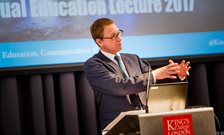Freedland: mainstream media and public can take on post-truth

“We all have work to do as consumers of information” said journalist Jonathan Freedland as he called on the public to play their part in tackling the rise of post-truth.
Delivering the 2017 King’s College London Education Lecture Post-truth, lies and fake news, Freedland outlined the dangers faced by societies at risk of surrendering any interest in facts or truth, and the countervailing forces that can halt this slide. This includes a citizenry prepared to “teach others about trusted sources and how to recognise fake news” and actively listening to people and institutions beyond our own filter bubble.
Journalism is by its nature “the best account of what's happening in the time available", and as such it faces serious challenges. With the rise of social media journalists have less time to check facts than they used to, and they are faced by purveyors of post-truth and fake news who specifically aim to “tear down institutions that aim to be truthful”.
Noting the comeback of ‘shoe-leather journalism’ in the US led by the Washington Post and New York Times in response to Donald Trump’s presidency (and his 780 proven falsehoods since taking office), Freedland made a strong case for the necessity of the mainstream media, saying that “government needs to be checked by an independent, educated press.” This can only continue to exist if the public is prepared to fund it.
Freedland noted the frequent failure of those offering facts and truth to couch their cases in more persuasively emotive terms, contrasting Danny Boyle’s 2012 Olympics opening ceremony with the Remain side in the 2016 EU referendum. He also pointed out that ‘fake news’ is not solely the preserve of the political right.
He ended by underlining the high stakes of our current moment. The anti-semitic ‘blood libel’ myth originated in England in the 12th century, a piece of intentional fake news that persisted for centuries with devastating effects. “Post-truth and fake news have served political, economic and religious agenda for over 1000 years, with real-world consequences.”
Christoph Meyer, Professor of European & International Politics at King's, gave a response to the lecture, noting that the phenomena of post-truth and fake news come in the context of longer-term trends of falls in trust in journalism and in society more generally. An audience Q+A, chaired by Professor Sharon Gewirtz, Head of the School of Education, Communication & Society, explored many of the themes of the lecture in more depth.
Watch the lecture in full.